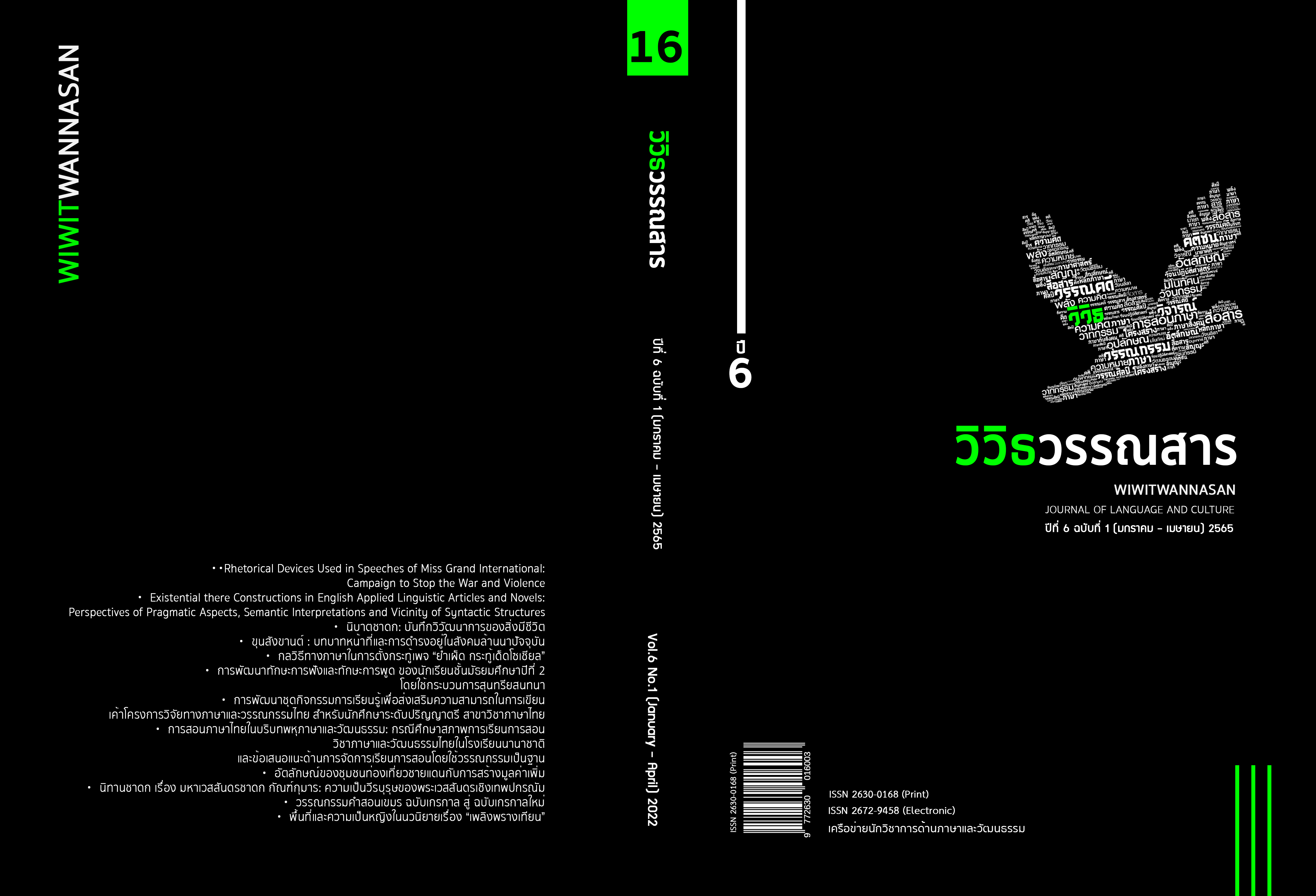Khmer Didactic Literature, Jbab Kekal to New Jbab Kekal
Main Article Content
Abstract
The word ច្បាប់ (jbab) or version in Khmer literature was a category of dedactive literature. During the 22nd - 25th Buddhist century, there appeared Jbab Kekal and New Jbab Kekal which was a dedactive literature with the same name by adding the word ថ្មី, meaning new. This academic article focused on the dedactive literature named the Krekal and new Krekal literature. The purpose of this study was to compare the common characteristics and relationships of the two literatures mentioned above. The results of the study were as follows:
- The results of the study of history and prosody leaded to the assumption that the Krekal version was written in the 22nd Buddhist century without its author. But in the new Krekal version the year of writing and the author of was stated in 1922 by name ‘Phra Bhirom Bhasa U’ or Krom Ngui. Both didactive literatures used the same type of prosody, Brahma Giti type. which was a prosody that could only be found in some didactive literature. While comparing to other contemporary dedactive literatures where Kakagati type was used.
- Results of the study of content Krekal edition. The leading part mentioned the purpose of the composition, but did not specify the composition period and who the author was. It began with the teachings by introduction to concrete practices and then didactive content. The final part inspired decendants to remember the teaching, but in the new Krekal version, the leading part specify the purpose of composition, the time period that was written and identified the source from the Krekal version and began with the didactive content by referring to the abstract. At the end of the text, the author inspired children to remember and apply the teachings and Identified the author. It ended with the content with the author's prayer. The main concepts of the teachings appeared to be consistent.
- The results of the study on the use of the words 'not to do' and 'to do' was found that the use of the word "don't" more rather than the word "should" was a reflection of the 'do not do' convention more than the ‘to do.' But considering the proportion of use of the aforementioned words from the Krekal version to the new Krekal version, It appeared that the word ‘should’ was used in larger proportions. It is a representation of the linguistic dynamics presented in these two dedactic literatures.
The results of the study showed that a wise author who considered the rewriting of the original dedactive literature at different times, would be able to create new works with more complete details by maintaining the distinctive characteristics and main ideas of literature.
Keywords: Khmer Dedactic Literature, Jbab Kekal, New Jbab Kekal
Article Details

This work is licensed under a Creative Commons Attribution-NonCommercial-NoDerivatives 4.0 International License.
Copyright is that of the journal any reproduction must be permitted by the editor of journal
References
References
Bandhumedha, B. (1982). Ditionary of Khmer-Thai, Vols 1-5. Bangkok: Rungrueangsan. (In Thai)
Bunkhoi, S. (2015). Khmer Literature. Bankok: Fine Art Department. (In Thai)
Johny (pseudonym). (2022, March 20). ច្បាប់កេរកាល បទព្រហ្មគីតិ. Wat Khemeraratanaram. Retrieved from https://watkhmers.org/ច្បាប់កេរកាល. (In Khmer)
Khing Hoc Dy (2003) Development of Khmer Literature. Phnom Penh. AIK. (In Khmer)
Khing Hoc Dy (ed.). (2007). Khamfaktamat. Phnom Penh: Ankor Baookshop. (In Khmer)
Ly-Theam Teng (1960) Khmer Literature. Phnom Penh. Seng Nguan Huat. (In Khmer
Ouk Ou. (1972). ច្បាប់កេរកាលថ្មី in Khamfak KromNgoy. Phmom Penh: Buddhist Institute. (In Khmer)
Phakdeekham, S. (2007). Relationship of Thai-Khmer Literature. Bangkok: Armarin. (In Thai)
Royal Institute. (2013). Royal Institute Dictionary. A.D. 2011, (2nd ed.). Bangkok: Royal Institute. (In Thai)
Royal Institute. (2017). Dictionary of Literary Terms (2nd ed.). Bangkok: Royal Institute Office. (In Thai)
Salee, B. (2008). Contemporary Khmer Literature. Mahasarakham: Aphichat. (In Thai)
Songsin, P. (2010) . Khmer Dedactive Literature. Bangkok: Dhonburi Rajabhat University. (In Thai)
Yoojaroensuk, Y. (2016) “Cbap Phseng Phseng”:Genders in Khmer Didactic Literatures, Vannavidat, 15, 77-12.1 (In Thai)


